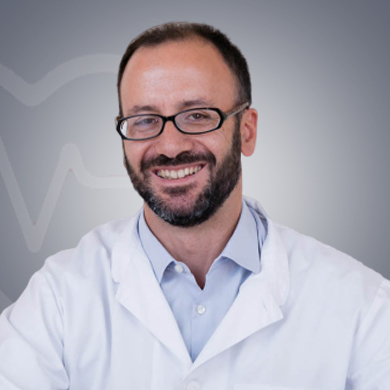
Dr. Liverezas Anastasios is a specialized Neurologist in Greece. And one of the most sought after medical specialists in Rhodes, Greece. The doctor has over 10 Years of experience and is associated with Euromedica General Hospital of Rhodes.
Association and Memberships Dr. Liverezas Anastasios is part of:
Qualifications :
Hospital Address :
Euromedica General Hospital of Rhodes, Eparchiaki Odos Koskinou, Tsairi, Greece
What is the medical expertise of Dr Liverezas Anastasios?
Please make sure to see your doctor using Telemedicine before you even board a flight
Listed below are some of the top Brain And Spine Specialists in other cities:
A brain and spine specialist specializes in the medical or surgical treatment of diseases and conditions of the brain, spine, and nervous system, including nerves, the spinal cord, muscles, and related blood vessels. They also diagnose and treat many neurological diseases, such as stroke, back problems, seizure disorders, brain and spine tumors, injuries, and birth defects. Neurosurgeons also perform surgery on the neck, back, brain, spinal cord, and peripheral nerves to treat neurological issues.
Brain and spine specialists are also experts who specialize in the prevention of brain, spine, and nervous system conditions and in reducing neurological disability. A neurologist might help your primary care doctor take care of you. A brain and spine specialist typically:
Candidates aspiring to become a neurologist must have a 5½ years MBBS degree followed by 2 to 3 years MD/DNB course. After gaining the Master's degree, candidates have to pursue D.M. (neurology) to specialize in the field of neurology.
The first step to becoming a brain and spine specialist is to get a bachelor’s degree from an accredited college or university. Students must choose a degree that weighs heavy in the sciences. After clearing a competitive examination, a student can gain entrance into a medical school.
A medical student needs to complete a five-and-a-half-year MBBS program that prepares a student to work as a medical doctor. A student’s final two years will include clinical rotations in his or her chosen medical specialty.
A neurosurgeon residency program prepares a doctor to work in the field and also offers the opportunity to complete rotations in many areas of surgery and sub-specialties. As a doctor has additional experience and responsibilities, they can start focusing on neurosurgery. A brain and spine specialist has the opportunity to extend their training after doing residency by completing a spine fellowship program.
A brain and spine specialist treats the below conditions:
Diagnostic tests and procedures are vital tools that help doctors confirm or rule out a neurological, spine disorder, or other medical condition. Doctors now use powerful and accurate tools to better diagnose disease. Many tests can be recommended by a brain and spine specialist to identity brain and spine disorders. Some common diagnostic tests recommended by a brain and spine specialist include:
If you or a loved one experiences unexplained symptoms that could be related to the brain, brain, or nervous system, your doctor may recommend a neurological exam with a brain and spine specialist.
If you experience any of the below symptoms, you should see a brain and spine specialist:
A brain and spine specialistcan help find out the cause of symptoms and develop a treatment plan for both complex and common neurological conditions. During a neurological exam, various instruments may be used to evaluate the nervous system. Motor skills, balance, coordination, and mental status may also be tested.
A brain and spine specialist will ask about your complete health history. They will conduct a physical exam to test your coordination, sight, reflexes, strength, mental state, and sensation.
In addition to tests and physical exams, you could get a lot of information at your first appointment. You may need to bring a family member or friend along with you. The person you bring can help ask questions, listen, and take notes.
Neurosurgical procedures can be performed for both pediatric and adult patients. There are a number of surgical and non-surgical procedures which are performed based on the nature of the disorder, type of injury, or disease. Modern non-invasive and invasive surgical procedures have simplified various brain surgeries up to a great extent. Below are some procedures performed by a brain and spine specialist: